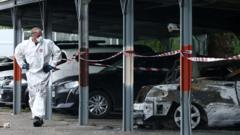Following a spate of violence against French prisons, authorities speculate that drug gangs may be behind recent attacks, with government officials asserting that enhanced law enforcement measures have led to this unprecedented counteroffensive.
French Prisons Under Siege: Drug Gangs or Political Extremists?

French Prisons Under Siege: Drug Gangs or Political Extremists?
A wave of coordinated attacks on prisons in France raises questions about the involvement of violent drug gangs in retaliation against government crackdowns on drug trafficking.
In recent days, French prisons have faced a troubling string of arson and gunfire incidents, prompting investigations into the motivations behind these coordinated attacks. Despite police asserting that all lines of inquiry remain open—including potential extremist left influences or foreign powers—there is growing belief that drug gangs are the culprits, retaliating against the government's intensified efforts to combat drug trafficking.
Interior Minister Bruno Retailleau spoke candidly in an address on Thursday, stating his conviction that the attacks, which have occurred across multiple locations, are the work of "drugs-yobs" or "narco-racaille." He emphasized the government's commitment to disrupting the flow of money to these gangs through new legislative measures aimed at drug trafficking.
The violent spree, which began on Sunday night, resulted in twelve attacks, notably including arson of vehicles outside prisons and a training center for prison officers. Gangs not only set fires but also brandished firearms at two of the sites. In many instances, the perpetrators left behind graffiti sporting the initials DDPF—an acronym purporting to represent "Rights for French Prison Inmates." A previously unheard-of group, the DDPF released a video on Telegram showcasing the burning of a prison officer’s car, while decrying recent policies by Justice Minister Gérard Darmanin.
Notably, the group's messaging featured a number of linguistic errors, leading many to question its credibility as a true far-left or anarchist faction. Observers noted that the majority of gangs typically do not endorse or advocate for prisoners' rights in this manner. Instead, criminals taken into custody often observe a different social and political dynamic that aligns more closely with the narcotics trade.
The French government is steadfast in its response to the escalating violence, spearheading parliamentary measures designed to weaken the grip of drug lords on society. A new prosecutorial branch will be established to specifically address drug crime, alongside increased investigative powers and enhanced protections for informants. Additionally, two prisons are set to be converted into high-security facilities intended for the most notorious drug offenders.
These measures follow the troubling escape of Mohamed Amra, a notorious drugs lord linked to the deaths of two prison officers last year. This incident, among others, has raised concerns regarding security protocols within French jails. The government argues that current attacks on prisons are indicative of an environment in which drug gangs feel threatened, striving to assert themselves amid a government crackdown.
With investigations underway, the government remains hopeful that identifying and apprehending the individuals behind these attacks will help elucidate the motivations behind this alarming wave of violence. French officials remain committed to demonstrating to the public their resolve in tackling the drug crisis head-on.




















